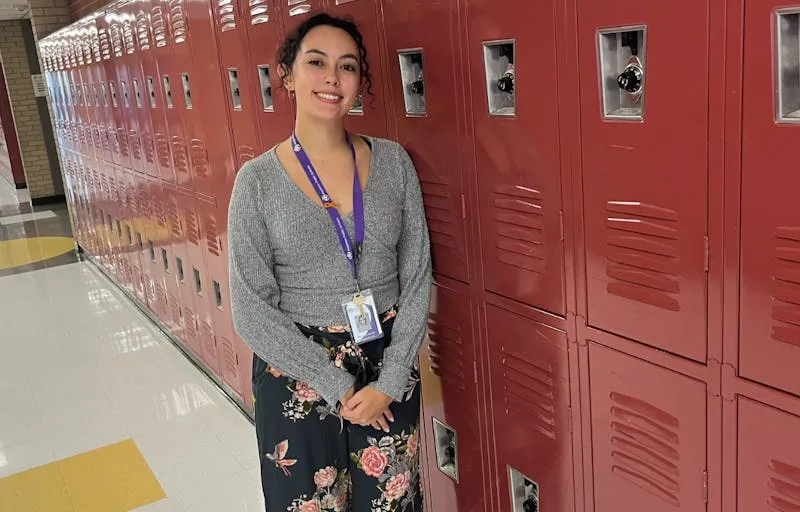This story was published by a Voices of Change fellow. Learn more about the fellowship here.
Part of my civic responsibility as an educator is to stay abreast of the news and its impact on K-12 education. However, in an increasingly fractious world, this is a depressing endeavor. Like many other anxious Americans, I’m guilty of getting hooked on the constant drip of doom-filled information on my phone and social media. As I read story after story of dysfunction and bad behavior these days, I can’t help but wonder whether the work I do as an educator still matters. In the face of compounding crises and a polarized, political gridlock, is running a school day in and day out still important?
In those moments, I remind myself that schools are not only a place where you learn foundational skills and concepts for the future; schools play an essential role in developing democratically engaged citizens who can discuss political differences and solve problems that make communities healthier and happier.
Teachers and school leaders know that strong academic skills are essential for informed citizens who can reason critically about the world. I also believe that social-emotional learning (SEL) is just as critical to healthy democratic engagement, especially in how students demonstrate care for others, navigate differing values with respect and develop the ability to collaborate and compromise.
If we can instill in kids the habits of caring, listening and reflecting, there’s real hope for the communities they’ll one day lead. That’s why schools must intentionally nurture these SEL skills through explicit instruction, coaching and authentic practice.
A Breakdown in Community
The inability to care about social or political issues, or collaborate across differences, is often nurtured in some of our first community experiences: schools.
In my first year as a fifth grade teacher in Nevada, some of the students in my class had formed tight-knit cliques and refused to work with peers outside of friend groups. Lacking SEL resources and training, I couldn’t show them that they didn’t have to be best friends, but they did have to work respectfully together. My class was orderly, but it wasn’t the collaborative community I wanted.
Feeling pressure from the administration to maximize academic instruction, I would frequently and regrettably tell my students, “We don’t have time for that right now,” when they brought interpersonal issues to class. One time, when I caught students passing disparaging notes to a classmate, instead of using the behavior as a teachable moment, I shut it down. I tossed the notes, leaving the hurt student feeling neglected and the other students unequipped to do better. Even if I’d had the time to address the issue, I didn’t know how to guide my students to consider their impact and care about the other person’s perspective.
When we don’t open up resources and time for SEL instruction, we also miss important opportunities to coach students on the habits they need to become thoughtful adults in their civic lives. And this isn’t just a classroom phenomenon. I’ve seen this breakdown in my community as everything from basic decisions about parks and recreation to complex housing issues becomes mired in destructive debate and personal attacks that prevent progress. I can’t help but notice how many of these “adult” breakdowns mirror those from my early days in the classroom.
Groundwork for Democratic Engagement
In 2014, following my teaching years in Nevada, I moved to a K-5 charter school in San Jose, California. The principal at my new school introduced me to an SEL curriculum for my classroom. I knew that the resource would fill a critical gap in my practice. As I experimented with teaching basic emotional awareness and conflict resolution skills, I noticed students showing more ownership for their actions and working through arguments independently. Right away, I saw the potential in these tools for supporting students in the not-so-simple act of being constructive community members.
Years later, in 2020, as a founding leader at Red Bridge, a private, K-8 school, my team and I decided to prioritize the development of our SEL curriculum, knowing that a strong foundation in emotional awareness, interpersonal skills and values-based decision-making would serve kids both academically and socially. I knew these lessons could influence the kind of community members students would become. With this in mind, we researched various SEL resources and defined core habits we wanted to instill, expressing them in student-friendly language, like:
- “Thinking about others and what they might need helps make our community a better place.”
- “I know how to respectfully navigate differences in values when I encounter them.”
- “Healthy relationships within a community are a two-way street that requires a balance of interests and sometimes compromise.”
Students who develop these habits are better equipped to solve problems in their communities. They know how to reach across differences, find common ground and make progress. Moreover, they care about their impact rather than looking away and expecting others — whether they are politicians or community leaders — to fix things.
Of course, just creating a list of skills wouldn’t be sufficient. Our team at Red Bridge also ensured time in the schedule for direct SEL instruction in weekly morning meetings, and we created opportunities for students to work collaboratively throughout the school day, whether through interactive games in math or project-based learning units. This allows them to authentically practice the interpersonal skills we’ve taught. When conflicts arise, as they naturally do, we don’t always brush them away or say there’s no time for them. Instead, we pause to coach students through the challenge.
As a result, daily, I hear students using language from their teachers and showing the mindsets of effective community members, like when they say, “I can be flexible” when compromising with a peer, or “maybe next time,” when they don’t get their way. When a first grader was upset and crying at lunch once, a fellow student coached her the way a teacher might. “It’s OK! I know you’re upset, but you’ll feel better soon. Feelings come, feelings go,” the student said, quoting the lesson they practiced in morning meetings that week.
Another time, I spoke with a fourth grader about his role in a conflict at recess. With little prompting, he said, “I think what I was trying to stand up for was right, but the way I did it was wrong. What should I have done differently?”
The work isn’t easy or ever complete. It requires a lot of time for our team to collaborate and often pulls us from our planned path for the day. However, these wins remind me that it is possible to build emotionally intelligent kids who care, and this gives me hope for their civic futures.
Schools as Spaces for Democratic Engagement to Thrive
SEL instruction alone won’t accomplish the entire goal of effective democratic engagement. It must be paired with the rigorous academic development necessary for effective decision-making. However, in a world where we’ve designed immense technologies and major scientific breakthroughs, what’s missing is our basic ability to get along. As some of our earliest and most consistent community experiences, schools play a vital role in fostering these SEL skills so students may leave with a deeply ingrained sense of healthy democratic engagement.
As educator Deborah Meier reminds us, democracy isn’t perfect or guaranteed, but it can work if we focus on growing our emotional thinking and empathy — rather than just hoping things turn out OK.


